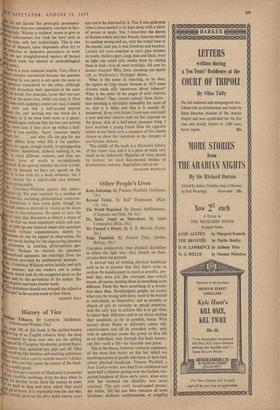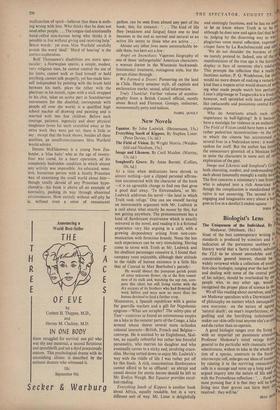Other People's Lives
The World Regained. By Dennis McEldowney. (Chapman and Hall, 10s. 6d.) CHILDREN instinctively treat physical disabilities in others the right way—they remark on them, yet take them for granted.
A normal way of treating physical handicaps used to be to pretend that they didn't exist; to cushion the handicapped as much as possible, pre- tend they were just like everyone else—which meant, of course, treating them as something quite different. There has been something of a revolu- tion since then. Handicapped people, no matter what may be wrong with them, want to be treated as individuals, as themselves; not as invalids or objects of pity or curiosity or special attention. And the only way to achieve this is to get them to admit their difference and to set about making their condition, as far as possible, better. With secrecy about illness or deformity comes self- consciousness and all its attendant evils: only with its admission comes the power to face life as an individual, only through this basic honesty can life—such a life—be bearable and good.
This is the theme, however variously expressed, of the three first books on this list, which are autobiographies of people who have, or have had, severe physical handicaps. Frances Warfield, a New Yorker writer, was deaf from childhood and spent half a lifetime getting over the hushed, mis- guided kindness of those early years, when even with her husband the disability was never admitted. 'The only really handicapped person,' she writes, '[is] the one who—because of some blindness, deafness, malformation, or crippling malfunction of spirit—believes that there is noth- ing wrong with him. Who thinks that he does not need other people.... The tongue-tied emotionally hand-cuffed non-human being who thinks it is possible to live without giving and receiving help.' Brave words: yet even Miss Warfield carefully avoids the word `deaf.' Hard of hearing' is the correct euphemism.
Rolf Thomassen's disabilities are more spec- tacular: a Norwegian spastic, a simple, modest, very religious man, he cannot control the use of his limbs, cannot walk or feed himself or hold anything, cannot talk properly, yet has made him- self independent by painting with the brush held between his teeth, plays the zither with the plectrum in his mouth, types with a stick strapped to his chin, takes an active part in Scandinavian movements for the disabled, corresponds with people all over the world, is a qualified high school teacher of drawing and painting and is married with two fine children. Before such courage, patience, ingenuity and sheer physical toughness (even his teeth crumbled away at the extra work they were put to), there is little to say : except that the book shows, besides all these qualities, an unselfconsciousness Miss Warfield would admire.
Dennis McEldowney is a young New Zea- lander, a 'blue baby' who at the age of twenty- four was cured, by a heart operation, of his completely bedridden condition in which almost any activity was impossible. An educated, sensi- tive, humorous person with a faintly Proustian way of examining the small world about him— though totally devoid of any Proustian hypo- chondria—his book is above all an example of normality, pushing its way through abnormal circumstances. How entirely without self-pity he is, without even a sense of reminiscent
pathos, can be seen from almost any part of the book; this, for instance : . . The kind of life they [weakness and fatigue] force one to lead becomes in the end as normal and natural as an active life seems to those who are active. . .
Almost any other lives seem unremarkable be- side these, but here are a few :
Angel on Snowshoes: Vigorous biography of one of those 'unforgettable' American characters: a woman doctor in the Wisconsin backwoods. Sentimental treatment, outrageous style, but the person shines through.
We Farmed a Desert: Pioneering on the land in Chile. Hearty amateur style, all capitals and exclamation marks; sound, solid information.
Truly Thankful: Further volume of autobio- graphy from a British Council official, mostly about Brazil and Florence. Gossipy, indiscreet, monumentally petty and tedious.
ISABEL QUIGLY































 Previous page
Previous page